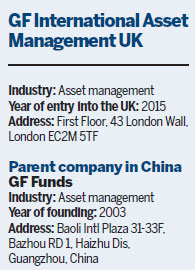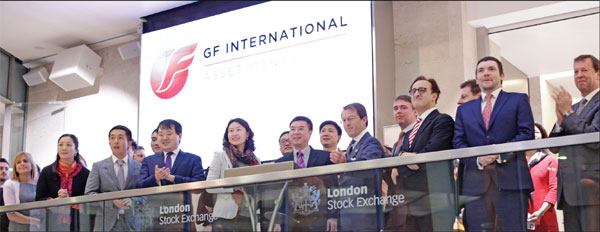Bridging the investment gap

GF Fund Management is well positioned in the UK as Beijing liberalizes capital market and Chinese seek opportunities abroad
China's GF Fund Management established a UK subsidiary in October 2015 and invited the British regulator, the Financial Conduct Authority, to tour its brand-new office at the heart of London's Square Mile financial district.
"They were surprised to learn that we signed a five-year lease for the office. They were perhaps impressed by our long-term commitment in London," says Miller Guo, CEO of GF International Asset Management UK, the UK subsidiary of GF Fund Management.
| GF International Asset Management UK celebrates the launch of its exchange traded fund product on the London Stock Exchange in January. Provided to China Daily |
The FCA representative's surprise perhaps reflects the frequent changes within London's investment community. After all, news of financial companies moving staff across different geographical regions is common, particularly now, with Brexit uncertainties. But Guo's team was resolute on its London plans.
"China is liberalizing its capital market, giving greater access to foreign investors, and Chinese investors are increasingly looking abroad for investment opportunities. We are well positioned to act as a link between these gaps," Guo says.
"We considered it to be a very good opportunity to export some of our excellent fund management capabilities into Europe, and look for investment opportunities for our Chinese clients," he says.
In the bond markets, China's $70 trillion (62.7 trillion euros; £55 trillion) interbank bond market is the third-largest globally, but less than 2 percent is held by foreign investors. China's stock market is the second-largest globally, but foreign investors' access there is also limited.
Historically, foreign investors have had very limited access to China's capital markets, but this has changed in the past few years, as the Chinese government allowed foreign institutional investors to invest in China's stock and bond markets.
The initiative to link the Hong Kong and Shanghai stock markets in 2014 has greatly increased international investors' holdings of Chinese stocks, and a collection of policy changes last year significantly opened up access to China's bond markets for foreign institutional investors.

It is against this backdrop that GF Fund Management's UK team was established. Guo says his team focused during its initial time in the United Kingdom on seeking the proper licenses to make investments and distribute products.
Of particular importance is the Renminbi Qualified Foreign Institutional Investor License, which allows it to invest in China's domestic capital markets, and the Undertakings for the Collective Investment of Transferable Securities license, which allows funds to distribute products freely across the European Union.
In January, GF International Asset Management launched its first product, an exchange-traded fund listed on the London Stock Exchange that tracks a portfolio of more than 700 stocks listed on the Shanghai and Shenzhen stock markets.
Listing this product on the LSE not only gained publicity for the exchange-traded fund but also for GF International Asset Management UK itself, Guo says. The listing became a useful distribution platform for the fund at a time when the company's own distribution channels in the UK and Europe are being established.
This exchange-traded fund gives international investors the ability to benefit from growth in China's large equity market without needing to buy the individual stocks themselves. The weighting of different stocks structured within the fund is in line with the FTSE Global China A Index, developed by FTSE Russell, the London Stock Exchange Group's index provider.
At the fund's launch in January, its unit price was $54.63. By the end of May, that rose to $56.25.Guo says the product has attracted client interest across the spectrum across Europe, from big government pension funds to individual wealth managers, although he admits the ETF's current $20 million fund under management is still small.
"We are looking to grow quite substantially. We hope that Chinese A shares' inclusion into main stock indexes such as FTSE Russell and MSCI would drive up investment volumes into our ETF substantially."
Global stock indexes provider MSCI's announced on June 20 that it will include 222 large Shanghai and Shenzhen listed companies into its widely followed Emerging Markets Index.
At home, GF Fund Management is well known for being one of China's biggest asset managers, with a client base of 8 million retail clients, in addition to institutional clients. In 2016, GF Fund Management's total assets under management were ranked the sixth-largest in China, according to financial data company Wind Information.
Founded in Guangzhou in 2003, GF Fund Management had about 400 employees and over $70 billion in assets under management at the end of 2016. Its history goes further back, as the asset management arm of the Guangzhou-based securities firm GF Securities, founded in 1991. GF Fund Management became a separate entity in 2003, and GF Securities remained its majority shareholder, with a 51 percent stake.
Wang Cong, a professor of finance at China Europe International Business School, says that GF Fund Management is a well-established brand in China and its success is supported by the fact that it holds a comprehensive collection of licenses and has a wide variety of products, including money market funds and open-and closed-ended funds. "These products give investors more choice," Wang says.

One such license is the Qualified Domestic Institutional Investor license, which GF Fund Management gained in 2009. This allows it to invest Chinese clients' funds in assets overseas. By 2016, GF Fund Management was managing a total of 125 open-ended funds, each targeting a different sector and assets, to provide investors with more choices. It is currently one of the asset managers looking after China's Social Security Fund.
Wang adds that he believes the opportunities that GF Fund Management hopes to capture by opening a UK office are valid, but more challenges exist in the area of attracting international capital to invest in China's onshore market.
"Here they face more challenges, because overseas investors' appetites for China's onshore assets are still limited, because of a lack of understanding and also the fact that Chinese stocks and bonds are not yet included in major international indexes.
Meanwhile, foreign investors' choices of channels for investing in China are increasing over time, including stock connects and the proposed connect between bond markets in Shanghai and Hong Kong.
"The increase of overseas investors' channels to invest in China means competition for GF Fund Management is growing, and they really need to focus more on communicating with overseas investors the advantages of investing through their products," Wang says.
Meanwhile, Guo says that GF Fund Management remains committed to London for the long term. "We chose our first overseas office in London because of London's friendly business environment, the good relationship between the Chinese and the UK governments, and the city's access to talent."
"We find London very welcoming. It is easy for new international companies to become part of the ecosystem. Investors here are diverse and global in nature, and they are willing to accept new products," says Guo.
Looking to the future, Guo says his team will work toward distributing more investment products in London. "We want to give European investors access to China's growth story, which we expect will become a popular trend as China's capital account liberalization continues and China's stocks and bonds gain international popularity through inclusion in leading international indexes."
cecily.liu@mail.chinadailyuk.com
(China Daily Africa Weekly 06/23/2017 page30)
Today's Top News
- Crossing a milestone in the journey called Sinology
- China-Russia media forum held in Beijing
- Where mobility will drive China and the West
- HK community strongly supports Lai's conviction
- Japan paying high price for PM's rhetoric
- Japan's move to mislead public firmly opposed































